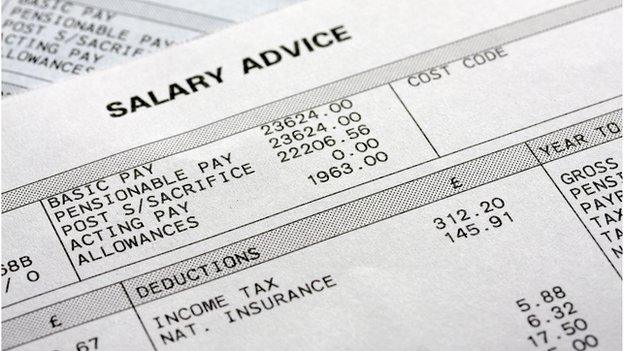Minimum Wage: Your legal rights
- Published

H&M and Welcome Break are among 37 firms, external who've been failing to pay staff the minimum wage.
The companies have been fined a total of £51,000 and must also pay the employees the £177,000 they were underpaid.
H&M blamed it on time logging issues, while Welcome Break said they had an IT problem.
So, here's some guidance on what to do if you think your employer isn't paying enough...
Step One:
Firstly, find out if you are actually being underpaid. You can do this by contacting free services including the Pay and Work Rights Helpline, external or ACAS, external.
They will help you work it out. Then you need to decide if you want to have that conversation with your boss yourself.
"It can be nerve wracking to raise these issues internally" says Mike Cain who's an employment solicitor from Slater & Gordon.
"But if you're mistreated or sacked as a result of raising a minimum wage issue, there is legal protection for you. The law is on your side."
Step Two:
Next, decide if you want to make an official complaint.
If you do, you need to go to HM Revenue & Customs, external (again you can do this through the Pay and Work Rights Helpline.)
They will investigate your claim and, ultimately, enforce the law by fining your employers and forcing them to pay up.
HMRC will ask you to give them all the evidence you have to prove you're not being paid the minimum wage.
Step Three:
You will have to decide at this point whether you want to be named in the complaint or not.
"It's a bit easier to win if you are willing to be named" says Paul Sellers, a minimum wage expert for the TUC, external which campaigns for a fair deal at work.
If you're named then you can give the HMRC a personal statement and they can confront your employer with that. Otherwise they're going to have to collect evidence themselves."

What happens next?
If you win, the firm will be fined and you'll get the money owed to you.
"But if your employer still doesn't pay up" explains Paul Sellers.
"HMRC will take them to an employment tribunal. This won't be at your expense, they will be pursued by the government."
Or, you can pay for an employment solicitor and take a case yourself. This can be expensive though.
If you join a Trade Union at work - they might take your case on for you and try to negotiate with your boss.
One last thing:
Your employer isn't allowed to take money out of your wages for things such as uniform, food or travel.
"The general rule is if you don't have any choice over the issue about the food you eat at work or how you get there or what you wear, things like boots or overalls, this isn't allowed to be deducted," says Paul Sellers from the TUC.
If this happens to you go to your nearest Citizens Advice Bureau, external for free guidance.
Follow @BBCNewsbeat , externalon Twitter, BBCNewsbeat, external on Instagram and Radio1Newsbeat, external on YouTube